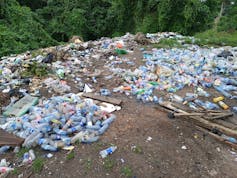The Osun River is one of the major rivers in southern Nigeria. It flows from its source in Ekiti State, through several states, before emptying into Lagos state’s Lekki Lagoon. It is an important source of water for the communities that live around it, whether for irrigation or for personal use.
Part of its course is in Osun State, where it flows through the Osun-Osogbo sacred grove, a Unesco world heritage site. Osun worshippers visit the river to pray daily. The largest gathering of worshippers and tourists is recorded during the yearly Osun-Osogbo festival, held in August.
Users of the Osun river need to be aware of a potential health hazard, however. In a recent study I conducted with colleagues, we found alarmingly high levels of microplastics in the Osun river. Our study found as many as 22,079 pieces of microplastic in just one litre of water.
We compared this data with 267 global studies on microplastics in river water conducted since 1994 and discovered that the levels of microplastics in the Osun river exceeded those reported in any of those studies. It’s a cause for serious concern.
This means that people using the Osun river’s water are being exposed to high amounts of microplastics. High levels of microplastics are also being ingested by the river’s fish.
Microplastics: the menace
Microplastics have gained the attention of scientists globally in the last decade. This is due to their widespread presence in the environment and effects on wildlife and humans. Microplastics are tiny plastic particles (below 5mm in size) that result mostly from the slow breakdown of plastic waste in the environment. Some of them also reach the environment through personal care products – like facial scrubs, creams and toothpaste.
Among other effects, microplastics block intestines of animals and kill over one million seabirds and 100,000 marine mammals yearly. They have also been found in human blood and placentas.
The presence of microplastics in the environment has been fuelled by the global increase in the production and use of plastics. The development of synthetic plastics in the first half of the 20th century spurred its production. From about 2 million tonnes of plastic in 1950, production increased to over 450 million tonnes by 2023.

Gideon Idowu, Author provided (no reuse)
The International Union for Conservation of Nature estimates that at least 14 million tonnes of plastic reach marine environments yearly as waste.
Africa contributes significantly to marine plastic pollution. Five countries on the continent (Nigeria, Egypt, Algeria, South Africa and Morocco) are among the world’s top 20 contributors to global marine plastic pollution.
Nigeria alone generates about 2.5 million tonnes of plastic waste annually. Only 12% of this is recycled. The largely unrecycled waste material finds its way into the rivers and the ocean.
In fish, sediment and water
To test the abundance of microplastics in the Osun river, we set up five sampling stations around the metropolis. Two of these were located upstream and outside the metropolis; two in the heart of the city; and one downstream on the outskirts. Samples of water and sediment (the soil below the river water) were taken at each of the stations.
We found microplastics in every sample of water and sediments, and in every individual fish examined. The fish species are all edible and normally sold to the Nigerian public.
Fifty-eight fish samples belonging to six different fish species were also caught from the river and the amount of microplastics present in their gastro-intestinal tracts was determined.
Microplastics were present in every fish sample at values ranging from 407 to 1,691 particles per fish. These amounts are far above those reported in fishes from other rivers in Africa. For example, in the case of tilapia from the Nile River, the maximum found was 47 microplastics per fish.

Gideon Idowu, Author provided (no reuse)
High microplastics concentrations ranging from 3,791 to 22,079 particles were found per litre of the water samples, and 392 to 1,590 particles per kilogram of the river sediments. The highest amount in the water (22,079 particles per litre) was measured close to the heart of the metropolis, where we also found many decaying plastic items in the river.
The microplastics were of different colours: white, black, brown, yellow, blue, green and red. However, black microplastics were the most abundant in both water and sediments. Spectroscopic analyses revealed that the black particles were mostly from polythene and nylon bags, commonly used as shopping bags in Nigeria. The detection of the polymer used in tyre production also indicated that some of the black particles might have come from wear and tear of car tyres.
Read more:
Microplastics found in Nile River’s tilapia fish: new study
What must be done
Microplastics in the Osun River have implications for aquatic biodiversity, as well as for human health. They create an “unnatural” environment that limits optimal growth and development of fishes and other aquatic species. Microplastics in fish can easily transfer to people when eaten. Indeed, fish from the river are being sold directly to members of the public.
The high level of microplastics in the Osun River means that people are exposed when they drink the water, bath in it or swim.
In addition, farm crops irrigated with the river water may accumulate microplastics in their roots, thereby limiting their growth. Microplastics may also be absorbed into plant tissues, providing another route of exposure to humans and animals.
Overall, the findings from our study reflect the magnitude of plastic pollution of the inland waters in Nigeria. This level of pollution is inimical to the blue-economy agenda of the Nigerian government, through which it hopes to diversify the nation’s economy via water-related industrial activities.
Stopping this pollution will require the development of a vibrant plastic-recycling industry and a ban on some single-use plastics.




